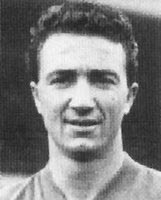

Casey: Thomas (Tommy)
1949-1950
(Player Details)
Wing Half
Born: Comber, Bangor, Northern Ireland: 11-03-1930
Debut v Preston North End (a): 27-08-1949
5’81/2” 11st 4 lb (1950)
Casey played for Comber, Clara Park and Belfast YMCA before joining Bangor. He won Irish
Youth Caps in 1948 and was one of three Bangor youngsters who joined Leeds in May 1949. He
was still an amateur and Bangor received no fee following his move. A year at Elland Road
brought little success for the dynamic midfielder, and he was allowed to leave in August
1950, signing for Division Three (South) Bournemouth. Two seasons with Bournemouth allowed
Casey to come to terms with life in English football, and after scoring twice in sixty-six
League games and playing twice in the F.A. Cup for them, in August 1952 he joined First
Division Newcastle United for £7,000 on the recommendation of Bill McCracken. While he was
chosen for the Northern Ireland F.A. team for their tour of USA and Canada in 1953, at St
James’ Park, Casey was never really a guaranteed starter, although he was always reliable
when called upon. Usually a tough-tackling left-half, he was also more than capable of
playing in a creative role, evidenced by his selection, when required, in the forward line.
In 1955 Casey played in six of Newcastle’s matches as they won the FA Cup, but it was only
after left-half rival Charlie Crowe strained ankle ligaments the week before the Final that
Casey’s place in the team was assured. He soon won the first of his twelve Irish full caps
and won a F.A. Cup Winners medal when he played in Newcastle United’s 1955 Wembley win.
Casey made his international debut against Wales in April 1955, stepping in as deputy for
Bertie Peacock. Over the next three years he found himself in-and-out of the side, making
way when Peacock was available. He did play in three games during Northern Ireland’s
successful 1958 World Cup qualifying campaign, scoring in the 3-0 win over Portugal at
Windsor Park. At the finals he played twice, both times in the forward line, as Peter
Doherty searched for a reliable goalscorer. He scored nine times in one hundred and
thirty-four games in all competitions at St James’ but after playing for Ireland in the
1958 World Cup he was transferred to Portsmouth for £8,500 in July 1958. He maintained his
place in Northern Ireland’s forward line for the first international of the season, wearing
the number nine shirt he scored in a 3-3 draw with England. Eleven days later he played his
final international, back as wing-half, as Northern Ireland were hammered 2-6 by Spain in
Madrid. After less than a season at Fratton Park, during which Portsmouth barely escaped
relegation from the First Division, Casey was signed by Bristol City for £6,000. He had
scored once in twenty-four League appearances and played once in the F.A. Cup while with
Pompey. Bristol were managed by Irish-boss Peter Doherty, who was well aware of Casey's
capabilities and Casey soon became a popular figure at Ashton Gate, but could do little to
save City from relegation to Division Three in 1960. After four years and scoring nine
goals in one hundred and twenty-two League games and making fifteen appearances in the F.A.
Cup, Casey left Bristol City to become player-manager of Gloucester City in June 1963 and
later that year he had a spell with Inter-Roma in Toronto Canada. He finished his playing
days with Distillery in Northern Ireland where he was Player/Manager. He later joined
Swansea Town as Trainer/Coach in October 1966 followed by being coach at Ammanford Town and
also had a spell as Manager of Distillery fom January 1967 to October 1968. He then had a
spell as Trainer/Coach of Everton, became Coventry City’s chief Coach in July 1972, before
Managing Grimsby Town from February 1975 until November 1976. He later coached FR Reykjavik
and Harstaad before leaving the game altogether to work as a fishmonger in Portbury, near
Bristol. He scored twice for Northern Ireland in twelve full International appearances. He
remained in the Bristol area until his death in a Nailsea nursing home on 11th January 2009
at the age of seventy-eight.